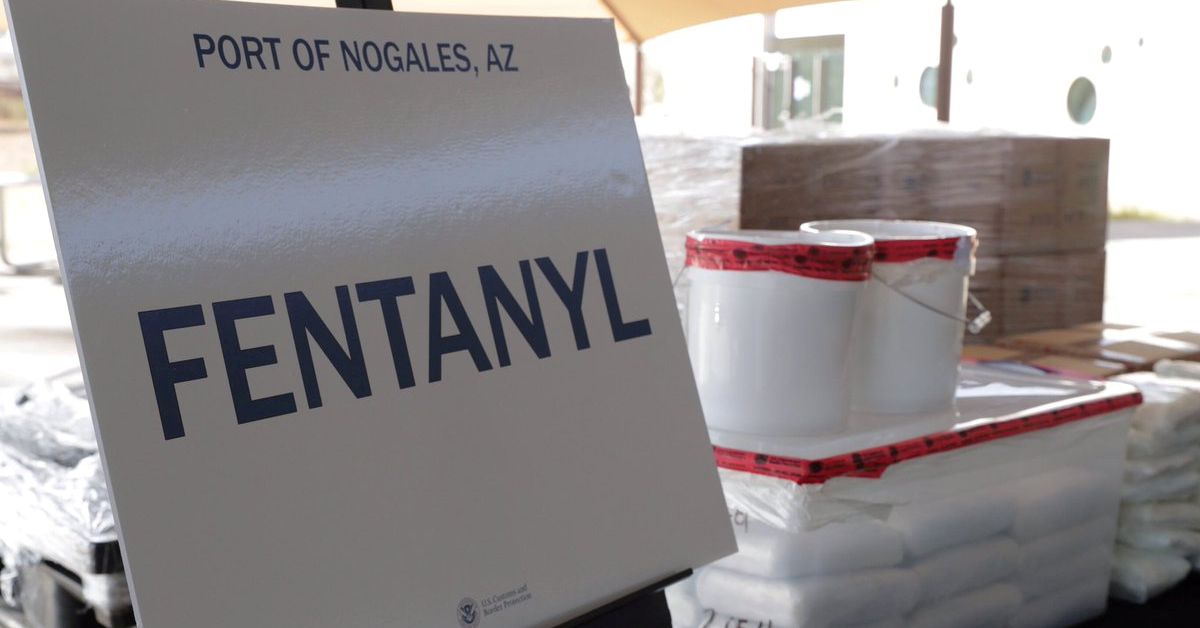MEXICO CITY, July 18 (Reuters) - Precursor chemicals used by Mexican cartels to make the deadly opioid fentanyl do not come from China, its embassy in Mexico said on Tuesday, rejecting U.S. officials’ accusations.
The embassy said in a statement that China had measures in place to prevent the trafficking of substances used to make illegal drugs, and added the U.S. was “blindly shirking its responsibilities” by not taking domestic action.
“The root of the fentanyl crisis in the United States is within itself,” the embassy said.
U.S. President Joe Biden’s administration has been seeking cooperation with both Mexico and China in stemming the flow of fentanyl, which has fueled a health crisis and a sharp rise in overdose deaths, as well as its precursor chemicals.
The U.S. Drug Enforcement Administration says the addictive painkiller and its precursors are transported from China to Mexico, the U.S. and Canada, often by international mail.
China had denied the illegal trafficking of fentanyl to Mexico in an April statement, though it did not address precursor chemicals.
The embassy on Tuesday said China was “actively coordinating and strengthening” supervision of drug-making substances with Mexico.
The U.S. embassy in Mexico and Mexico’s foreign ministry did not immediately respond to requests for comment.
The Chinese statement, the embassy said, comes after recent comments from U.S. Ambassador to Mexico Ken Salazar and other U.S. officials.
Last week, the U.S. Treasury sanctioned 10 people with suspected ties to the Sinaloa Cartel’s fentanyl network, as well as a company accused of importing chemicals from China.
“This represents a blow to (the cartel’s) financial operations and illicit activities, since the company receives chemical shipments from China,” Salazar said in a statement.



Interesting. Your quote says China controlled fentanyl, but states the precursors were restricted in the Hong Kong SAR, and they may go through the SAR.
Does China itself restrict the precursors? Or could they be making their way out through other routes?
China certainly helped get the ball rolling for the 4 years between 2015-2019, and then divested itself to some extent, which is driving the demand for other sources. I doubt India is going to stop exporting precursors anytime soon. Their pharmaceutical industry is insanely unethical.
Mexico is mostly owned by the narcos, so they’ll “cooperate,” but the fentanyl will continue to flow as long as they can get precursors. It seems the US has quite a pickle on its hands.
Hopefully, the crisis will die out over time? (oof, that’s a lot of bodies) Unless the US pharmaceutical companies have a new, “non-addictive” pain killer they’re promoting these days.
China started regulating the two primary precusors ANPP and NPP in 2017 considering them their equivalent of a schedule 1 drug (Administrative Measures on Narcotics and Psychotropic Substances without Medical Use) Here is the history of their drug control:
https://www.unodc.org/LSS/Country/DetailsLegalSystem?code=DLIL&country=CN
Thanks for pointing that bit out!
So if this quote is to be believed:
It looks like China is struggling to enforce their controls. I’m trying to think of a reason that doesn’t boil down to a lack of political will. I don’t blame them, though. They certainly have a bunch of more pressing, complex domestic problems (balancing environment, business, and social welfare). I would certainly shrug as well when Uncle Sam comes whining when those he trampled on are dying from poisons you’ve made illegal and are being produced somewhere else. It’s not like any other nation can perfectly control their imports and exports. They probably are just denying it altogether to save face with their people.
I’m always surprised at just how capitalist Chinese businesses are.